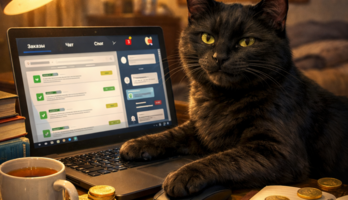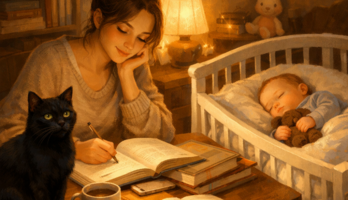Т.В. Артеменко, Е.В. Кривощекова, Е.В. Кравченко, Н.Е. Николаева - Reader in Language and Culture - Part II (1110506), страница 13
Текст из файла (страница 13)
Thanks to JKRowling's story telling talent, it is easy to believe that Harry's transitionfrom sad schoolboy to famous wizard is the most natural thing in the world.5.Secondly, British people always like to take the side of theunderdog and Harry has all the attributes of one. Harry is an orphan and isforced to live with his cruel Aunt Petunia and uncle Vernon, and theirdreadful son, Dudley.6.Thirdly, the school which Harry is sent to, Hogwarts, has a lot incommon with a classic British public school.
For example, a lot of the problems that Harry and his friends are facing in Hogwarts are class-related,such as the question of 'pure blood'. It is well-known that in many publicschools children from poorer and lower-class families are looked down on.The organisation of Hogwarts is also very similar to a public school with itsstrict teachers, boarding houses and attention to sports. However, it is still70easy for children to identify with Harry and his friends because they alsobehave like ordinary modern teenagers. And, of course, children (and theirparents) just love all the horrible, dark things that happen in the books.7.The popularity of Harry Potter and the sale of Harry Potter goodsare likely to stay for the near future at least.
However, amongst thehundreds of things for sale connected to the books and films, the mostinteresting development has been the dramatic increase in the sale oftraditional broomsticks. Look towards Britain on a clear night and younever know what you might see flying in the sky!About the writer — J. K. RowlingJ. K. Rowling was born in a small town near Bristol. She alwaysliked writing and wrote her first story when she was only five! Afterschool, j she went to university to study languages and then became ateacher of French.
The writer says that Harry Potter was born on along train journey and was originally seen as just a bit of entertainmentfor the writer's daughter Jessica. At the time, J. K. Rowling, known asJo to her friends, was a single mother working hard to make enoughmoney to support her daughter. It was the publishers who advised Jo touse her initials — J.
K. instead of Jo, as they thought that adventures ofan 11 -year-old boy would not be popular amongst teenagers if writtenby a woman. Now, Harry Potter books are so popular all around theworld that J.K. Rowling has become one of the richest people in theUK. She is even richer than the Queen with an estimated fortune of 280million pounds!British tourist industry — new tourist attractionsThanks to Harry Potter, Britain has got a tourism boost.
As HarryPotter movies have been filmed all around Britain, there are now a fewplaces that are proud to have been seen in the Harry Potter films. For71example, Harrow School, Durham Cathedral and now the Highlands inScotland. Many people decide to visit those places only because theyfeature in the Harry Potter films.About the main character — Daniel RadcliffeDaniel Radcliffe who plays Harry Potter is a pleasant 15-ycar-old.People who know him say that he is a very friendly, kind and intelligentyoung man.
He likes playing the guitar and does all the things thatyoung people of his age normally do. However, playing Harry Potterhas not been easy for him. Daniel says that there was a time when hewas not sure where Harry ended and Daniel began. He felt so close toHarry as if they were the same person. Daniel even wanted to stopplaying Harry Potter to concentrate on his studies and get his life backbut later changed his mind. Right now, Daniel is filming the next HarryPotter film — Harry Potter and the half-blood Prince.I.1. What account for the phenomenal popularity of Harry Potterbooks?2. What unexpected cultural effect did it have?3.
What makes Harry Potter such a likeable character? Is he equallypopular among children and adults?4. How did J.K. Rowling become a professional writer?5. What economic effects does the series have?6. Why has playing Harry Potter been not so easy for the actor?II.1.Have you read any or maybe all the Harry Potter books or seenthe films? What are your impressions?2.3.Do you think the books’ success is long-lasting? Why?Do you know anything about Daniel Radcliffe’s further career?72TV or not TV?Television has become an everyday part of our lives. It's omnipresent,always on... But is this a good thing or a bad one? Don't we spend too muchof our precious time in front of the 'box'? Haven't we become lazier becauseof it? Is TV dangerous? Here's what different people say about television.Who do you agree with?For• Some people say that television is dangerous.
I don't think so. Afterall, it keeps you informed about what's happening in the world. You canalso see films and plays, and be entertained... or you can watchdocumentaries and learn something new.• In spite of all its defects, television can teach us a lot of things. Thetrick is to learn to control it and use it intelligently. The ideal is to turn onthe TV only when there is a programme which is really amusing and interesting.•A lot of rubbish has been written about television. I think it's awonderful invention.It's a cheap form of entertainment, which gives pleasure to millions ofpeople, especially those who live alone.
It's also a wonderful way ofescaping from our dull reality.•TV's just part of life really. It involves us in strong emotions: love,hate, passion. Even the silliest of 'soaps' help me to solve my own problemsby showing me what might happen if I do certain things.
Sometimes theyshow me what not to do.Against•Television is a terrible waste of time. I know a lot of people whojust sit down in front of the 'box' and watch whatever's on. They spend73hours watch ing silly Mexican soap operas and second-rate American filmswhen perhaps they ought to be doing something else. • In my opinion,television makes us lazier. We stay at home instead of going out. We readless. We think less. We even talk less. It cuts us off from reality. But isn'treal life better than this passive enjoyment?• There's too much blood and violence on TV.
We begin to believe thatthe world is an unfriendly place, filled with cruel people and riskycircumstances. The violent, crime-filled world shown on TV may turnpeople into criminals.•Television is like a drug: we get addicted to certain TV series andsimply can't switch it off. Most programmes are filled with sillycommercials. What I hate most about TV is that it often uses stronglanguage.
It has a terrible influence on children and young people.Questions.1.What are the pros and contras of television?2.How many hours do you spend in front of the TV?3.Do you believe that violence on TV may turn people intocriminals ?4.In what way does TV influence our language?5.Some people say that television kills conversation. Do you agree?Additional texts.Strange British Customs741.Once a year it is the custom for women to cook flat cakes in afrying pan, and run down the street, throwing the pancakes into the air, andcatching them in the pans.2.Sometimes men tie bells onto their legs and dance in the streets,waving their handkerchiefs in the air.3.It is an old custom to tie ribbons to a tall post, and dance around ituntil all the ribbons are wound round it.4..Once a year a group of young men roll a large cheese down a hill,and then run down after it.5.It is the custom on one day in the year to put apples into a bowlfull of water, and try to pick them with your teeth.6.Sometimes two young men sit over a river on a long pole, whichhas been covered in grease, and try to knock each other off it by hittingeach other with pillows.7.There's a nettle-eating contest in Britain every year.
Thecontestants try to eat as many nettles as they can.In fact all these extraordinary things are true.1. This is the traditional pancake race, which is held on Shrove Tuesday.2. This is Morris dancing and it is still sometimes seen, especially invillages and country towns, insummer.3.
This is the old English maypole. Many villages still have a maypole,although the dancers areusually children nowadays.4. This is the custom of cheese rolling, which happens on Whit Monday.5. This is part of the traditional Halloween celebrations held on 31October.6. This is an old competition, which is still seen at midsummer fairs.75Often the prize is a farmanimal, usually a pig.7. This contest takes place every summer in Dorset.
A word of warning:Don't try nettle-eating if you don't know the 'secret method'.Class System1.Some things about Britain make sense only to the British. Ofthese, probably the strangest is social class.2.There are three main class divisions in Britain with some ' i nbetween' variations (such as "upper middle'): upper, middle andlower or working class. And people in Britain are very conscious of classdifferences.3.The different classes in Britain tend to eat different food atdifferent time of the day (and call the meals by different names), theylike to talk about different topics, they enjoy different pastimes andsports and have different ideas about the correct way to behave.4.The easiest way to guess the class to which the person belongs tois to listen to the way he or she speaks.
A person's accent in Britain is anidentity card. Other people will be able to say what social background youcome from, where you were born or educated, and what kind of job youdo.5.Changing an accent is difficult, even for actors. To achievethe desired accent, a British person must speak it from childhood. Thisis one of the reasons why people still send their children to expensiveprivate schools. It is not that the education th er e is b etter , butbecause, as adults, they will have the right accent and manners.766.A person's vocabulary is also very important.













